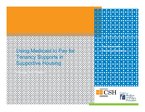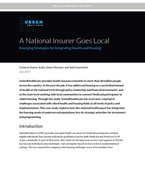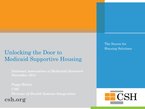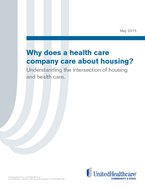Found 433 resources.
0
0
0
Enhance your knowledge around family homelessness and the McKinney-Vento Homelessness Assistance Act's definition of "homeless" as it refers to children and youth. Review other relevant federal regulations for Head Start, Early Head Start, and Child Care and Development Fund (CCDF)-subsidized programs.
This interactive learning series is intended for professionals in Head Start, Early Head Start, and child care, including early childhood and school-age child care providers, CCDF Lead Agency or designated entity staff, and other key stakeholders. Learn how to identify...
Topics: Child welfare, Early childhood, Education, Family engagement, Grade-level proficiency, Homelessness, Housing, Low-income, Stability
0
0
0
Although the rental assistance programs varied, key themes emerged, including (1) most programs, recognizing the impact of housing stability on health outcomes, targeted populations served by state or local health and human services programs; (2) most programs served a growing number of households over time; (3) funding generally increased over time and most of it came from general revenue; and (4) programs involved collaboration between the housing and health and human services agencies to ensure clients’ needs were comprehensively met.
Topics: Funding, Health, Housing, Legislation & Policy, Low-income, Partnerships, Place-based, Research, Stability
0
0
0

An organization is using the influence that teenagers have on their contemporaries to help more students from low-income families gain college admission and student aid.
Topics: Education, Low-income, Mental health, Post-secondary, Stability, Youth
0
0
0
The Colorado Coalition for the Homeless (CCH) has been investing in supportive housing since 1990. Since that time, this comprehensive community health center has developed nearly 1,700 units of housing, and is one of the country’s leaders in integrating health care and housing for a vulnerable population.
This webinar discusses how CCH finances its capital development; how they plan, design, and manage multiple projects simultaneously; how they integrate housing and health care services; and how they include property management staff in a coordinated approach to care. This conversation...
Topics: Health, Homelessness, Low-income, Medicaid / Medicare, Mental health, Pacific Northwest, Place-based, Supportive housing
0
0
0
At a recent symposium convened by Capital One in Plano, Texas, practitioners, researchers, funders, business leaders, technologists, and other stakeholders discussed ways local leaders can harness technology and data to increase access to opportunity. This issue is particularly relevant in the Dallas metropolitan area, which is one of the country’s fastest-growing tech hubs yet still struggles with a lack of economic and racial inclusion.
Topics: Broadband, Low-income, Place-based
0
0
0
Students have around 60 programs at their disposal, from advanced manufacturing to emergency medical response.
Topics: East Coast, Education, Food insecurity, Health, Low-income, Post-secondary, Youth
0
0
0
Using administrative data from Massachusetts, this study analyzes the health care use and Medicaid expenditures of families who experienced one or more homeless episodes between 2008 and 2015 to investigate how health care use is related to emergency housing experiences.
Topics: Asthma, Child welfare, Depression, Health, Homelessness, Housing, Low-income, Medicaid / Medicare, Metrics, Pre-natal, Research
0
0
0

Nationally, resources for providing families with housing assistance are inadequate. DC is piloting a new approach, the DC Flexible Rent Subsidy Program (DC Flex), to test whether shallow (smaller than the average subsidy, over a defined period) and flexible subsidies can help more families maintain affordable, adequate housing.
Topics: Cost effectiveness, East Coast, Housing, Low-income, Research, Stability
0
0
0

In 17 years, the Family Independence Initiative has enrolled 3,000 families — four people per household on average — and is operating in 14 different cities across the country. Now the initiative is making a move into 10 neighborhoods across Chicago. With a $2.6 million backing from Google.org and the City of Chicago, the organization hopes to combat poverty and improve the quality of life for 1,000 families on the South and West sides by giving money directly to them while also strengthening their social ties.
Topics: Asset building, Low-income, Midwest, Workforce development
0
0
0

An estimated half of all college students struggle with food insecurity, even at elite flagship universities like the University of California, Berkeley, and selective private schools like Northwestern University. Former foster youth, L.G.B.T. students and students of color are at substantially increased risk. Food insecurity is strongly linked to lower graduation rates.
Topics: Low-income, Post-secondary, Youth
0
0
0

A children’s hospital in Columbus, Ohio, is trying to treat a difficult patient: Its own struggling neighborhood.
Topics: Affordable Care Act, Child welfare, Health, Housing, Low-income, Midwest, Partnerships
0
1
1
About 20 percent of adults in sheltered homeless families have a disability, compared with 9 percent of all US adults, yet few studies have addressed the intersection of disability and housing instability. A recent study explored the relationship between disabilities and Supplemental Security Income (SSI)/Social Security Disability Insurance (SSDI) income that homeless families reported when they entered emergency shelters, as well as later outcomes, such as housing stability, self-sufficiency, and food insecurity. It also examined how housing interventions affect SSI/SSDI income receipt.
Topics: Disabilities, Homelessness, Housing, Low-income, Research, Stability
0
0
0
Many social issues stem from a history of unstable, unaffordable, and poor-quality housing. Research shows that housing is the first rung on the ladder to economic opportunity for individuals and that a person’s access to opportunity is intrinsically linked with that of the community at large. As the gap between rents and incomes widens, it is critical that professionals in fields outside housing—including health, education, and economic development, among others—understand its central importance.
Topics: Community development, Education, Health, Housing, Low-income, Metrics, Partnerships, Research
0
0
0

Harvey — and its record rains — is long gone. But life may never be the same for thousands of children who spent the past school year — and will spend the one that just began — without a home. Their schools have been rebuilt. Their lives have not.
Topics: Child welfare, Education, Homelessness, Housing, Low-income
0
1
1

San Francisco health officials working to end HIV infections and deaths in The City are zeroing in on the homeless population, where there’s been an uptick in new cases.
Topics: Health, Homelessness, Legislation & Policy, Low-income, Preventative care, West Coast
0
0
0
The King County Housing Authority (KCHA), in partnership with the Highline School District and the nonprofit social service organization Neighborhood House, launched the Student and Family Stability Initiative (SFSI) pilot program in 2013 to provide housing and employment supports to homeless and unstably housed families with children enrolled in Highline elementary schools. In 2016, KCHA contracted with the Urban Institute (Urban) to conduct a process and outcome evaluation of the program’s first three pilot years. This evaluation documents how SFSI works, who it serves, and how well it...
Topics: Attendance, Dual-generation, Education, Family engagement, Housing, Low-income, Pacific Northwest, Partnerships, Place-based, Research, Stability, Workforce development, Youth
0
0
0
Maternal depression is a widespread public health concern that has been linked to negative impacts on child development and health outcomes. Within home visiting programs serving low-income women, maternal depression rates have been measured as high as 61 percent. Home visitors are uniquely positioned to help address maternal depression and can play an important role in conducting screenings and providing referrals to community resources. This brief summarizes the existing research to illustrate the importance of addressing maternal depression in home visiting programs, and outlines three...
Topics: Early childhood, Health, Homelessness, Low-income, Mental health
0
0
0
About MDRC’s “Evidence First” Podcast Series:
Policymakers talk about solutions, but which ones really work? Join Katie Beal, MDRC’s External Affairs Associate, as she talks with experts about the best evidence available on education and social programs that serve low-income people.
Topics: Education, Funding, Legislation & Policy, Low-income, Post-secondary, Workforce development, Youth
0
1
1

Our initial report—which followed participants around the country over three years—found, among other things, that Year Up increased participants’ average quarterly earnings by more than 50 percent. These are the largest gains in earnings measured to date in random assignment studies of workforce training programs for youth and adults.
Topics: Asset building, Education, Low-income, Mobility, Post-secondary, Research, Workforce development, Youth
 Shared by Housing Is
on Aug 16, 2018
Shared by Housing Is
on Aug 16, 2018 0
0
0
Partnerships between medicaid and supportive housing providers
Topics: Cost effectiveness, Funding, Health, Legislation & Policy, Low-income, Medicaid / Medicare, Partnerships, Supportive housing
 Shared by Housing Is
on Aug 9, 2018
Shared by Housing Is
on Aug 9, 2018 0
0
0
UnitedHealthcare provides health insurance benefits to more than 40 million people across the country. In the past decade, it has addressed housing as a social determinant of health at the national level through policy leadership and financial investments, and at the state level working with local communities to connect Medicaid participants to stable housing. Through this work, UnitedHealthcare has overcome a myriad of challenges associated with siloed health and housing fields at all levels of policy and implementation. This case study explores how this national health payer has integrated...
Topics: Affordable Care Act, Data sharing, Funding, Health, Homelessness, Housing, Low-income, Medicaid / Medicare, Partnerships
 Shared by Housing Is
on Aug 9, 2018
Shared by Housing Is
on Aug 9, 2018 0
0
0
Introduction to supportive housing and notes from the field
Topics: Health, Housing, Low-income, Medicaid / Medicare, Mental health, Partnerships, Supportive housing
 Shared by Housing Is
on Aug 9, 2018
Shared by Housing Is
on Aug 9, 2018 0
0
0
In a post health care reform era, Medicaid programs need to build system capacity to effectively manage increasingly complex Medicaid populations while simultaneously seeking innovative solutions to reduce costs and improve access. As states are increasingly becoming more reliant upon managed care for complex populations – such as individuals in need of long-term services and supports, those with intellectual or developmental disabilities, individuals with severe and persistent mental illness, as well as children with special health care needs – the needs of these populations range far beyond...
Topics: Funding, Health, Housing, Low-income, Medicaid / Medicare, Partnerships
 Shared by Housing Is
on Aug 9, 2018
Shared by Housing Is
on Aug 9, 2018 0
0
0
Everyone needs safe, decent, stable housing. For some of the most vulnerable people in America — people with mental illness, chronic health conditions, histories of trauma, and other struggles — a home helps them to get adequate treatment and start on the path toward recovery. But some conditions make it difficult for people to maintain a stable home without additional help. Supportive housing, a highly effective strategy that combines affordable housing with intensive coordinated services, can provide that needed assistance.
Topics: Cost effectiveness, Disabilities, Health, Homelessness, Housing, Low-income, Medicaid / Medicare, Mental health, Place-based, Seniors, Supportive housing
 Shared by Housing Is
on Aug 9, 2018
Shared by Housing Is
on Aug 9, 2018 0
0
0
Social determinants of health are the economic and social conditions that affect health outcomes and are the underlying, contributing factors of health inequities. Examples include housing, educational attainment, employment and the environment.
Topics: Affordable Care Act, Disabilities, Health, Homelessness, Housing, Low-income, Medicaid / Medicare, Mental health, Partnerships, Place-based, Substance abuse, Supportive housing
 Shared by Housing Is
on Aug 9, 2018
Shared by Housing Is
on Aug 9, 2018 





